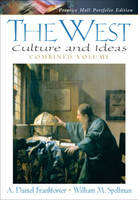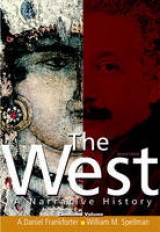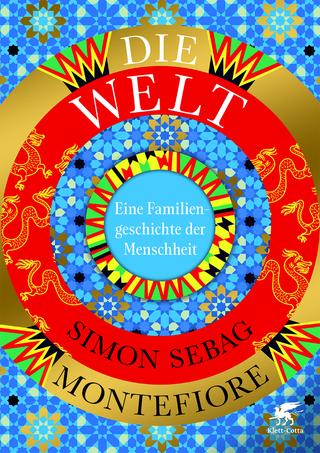
The West
Pearson (Verlag)
978-0-13-748971-8 (ISBN)
- Titel erscheint in neuer Auflage
- Artikel merken
A text conceived from its inception to be brief, The West takes an idea-based approach to examine Western Civilization in the broadest possible terms. By placing Western Civilization in a larger context, The West helps students to better understand current events and to re-evaluate common assumptions. Going beyond the purview of traditional texts, The West urges students to think more deeply about the nature of civilized life by consistently relating historical developments to environmental contexts—both natural ecologies and cultural legacies. Finally, The West encourages students to relate the experiences of long-vanished peoples to their own lives by posing a “Larger Issue”—a question of broad scope or general significance—at the beginning of each chapter. Each “Larger Issue” provides a springboard for wide-ranging class discussions on the fundamental social and political issues in Western Civilization. The Portfolio Edition format features a concise, trade—like narrative for approximately 60% less cost to the student than a comprehensive text.
Daniel Frankforter is Professor of Medieval History at the Pennsylvania State University. He holds a bachelor's degree (philosophy) from Franklin and Marshall College, a master of divinity degree from Drew University, and master's and doctoral degrees (in medieval history and religious studies) from Penn State. His research has focused on the medieval English church and on the evolving role of women in medieval society. Articles on these topics have appeared in Manuscripta, Church History, The British Studies Monitor, The Catholic Historical Review, The American Benedictine Review, The International Journal of Women's Studies, Classical and Medieval Literature and Criticism, The Encyclopedia of Monasticism, and The Journal of Women's History. His books include: A History of the Christian Movement: An Essay on the Development of Christian Institutions, Civilization and Survival (vol. 1), The Shakespeare Name Dictionary (with J. Madison Davis), The Medieval Millennium: An Introduction, (2nd edition) The Western Heritage, Brief Edition (3rd edition, with Donald Kagan, Steven Ozment, and Frank Turner), an edition and translation o£ Poullain de la Barre's De L'Egalite des deux Sexes, and Stones for Bread: A Critique of Contemporary Worship. With over thirty years of teaching experience, he has developed fifteen courses focusing on aspects of the ancient and medieval periods of Western civilization, religious studies, and gender studies. His work in the classroom has been acknowledged by the Penn State Behrend Excellence in Teaching Award and the prestigious Amoco Foundation Award for Excellence in Teaching Performance. William M. Spellman is Professor of History at the University of North Carolina, Asheville. He is a graduate of Suffolk University, Boston, and holds the Ph.D. from the Maxwell School of Citizenship and Public Affairs at Syracuse University. He is the author of John Locke and the Problem of Depravity (Oxford, 1988); The Latitudinarians and the Church of England, 1660-1700 (Georgia, 1993); John Locke (Macmillan, 1995); European Political Thought, 1600-1700 (Macmillan, 1997); Monarchies, 1000-2000 (Reaktion, 2000); and The Global Community: Migration and the Making of the Modern World, 1500-2000 (Sutton, 2002).
1. The Birth of Civilization.
2. The Rise of Empires and the Beginning of the Iron Age.
3. Aegean Civilizations.
4. The Hellenic Era.
5. The Hellenistic Era and the Rise of Rome.
6. Rome's Empire and the Unification of the Western World.
7. The West's Medieval Civilizations.
8. The Emergence of Europe.
9. Europe Turns Outward.
10. Europe's High Middle Ages.
11. Challenges to the Medieval Order.
12. Renaissance and Exploration.
13. Reformation, Religious Wars, and National Conflicts.
14. The Early Modern State, 1600-1789.
15. New World Views: Europe's Scientific Revolution.
16. The Age of Enlightenment: Rationalism and Its Uses.
17. Rebellion and Revolution: American Independence and the French Revolution.
18. The Age of Ideology in Western Europe, 1815-1848.
19. Industry, Society, and Environment.
20. The Consolidation of Nation-States.
21. Global Empire and European Culture, 1870-1914.
22. World War I: The End of Enlightenment.
23. The Troubled Inter-War Years, 1919-1939.
24. World War II: Europe in Eclipse.
25. The Cold War Era.
26. Western Civilization and the Global Community.
| Erscheint lt. Verlag | 2.6.2004 |
|---|---|
| Sprache | englisch |
| Gewicht | 930 g |
| Themenwelt | Geisteswissenschaften ► Geschichte ► Allgemeine Geschichte |
| ISBN-10 | 0-13-748971-4 / 0137489714 |
| ISBN-13 | 978-0-13-748971-8 / 9780137489718 |
| Zustand | Neuware |
| Haben Sie eine Frage zum Produkt? |
aus dem Bereich



